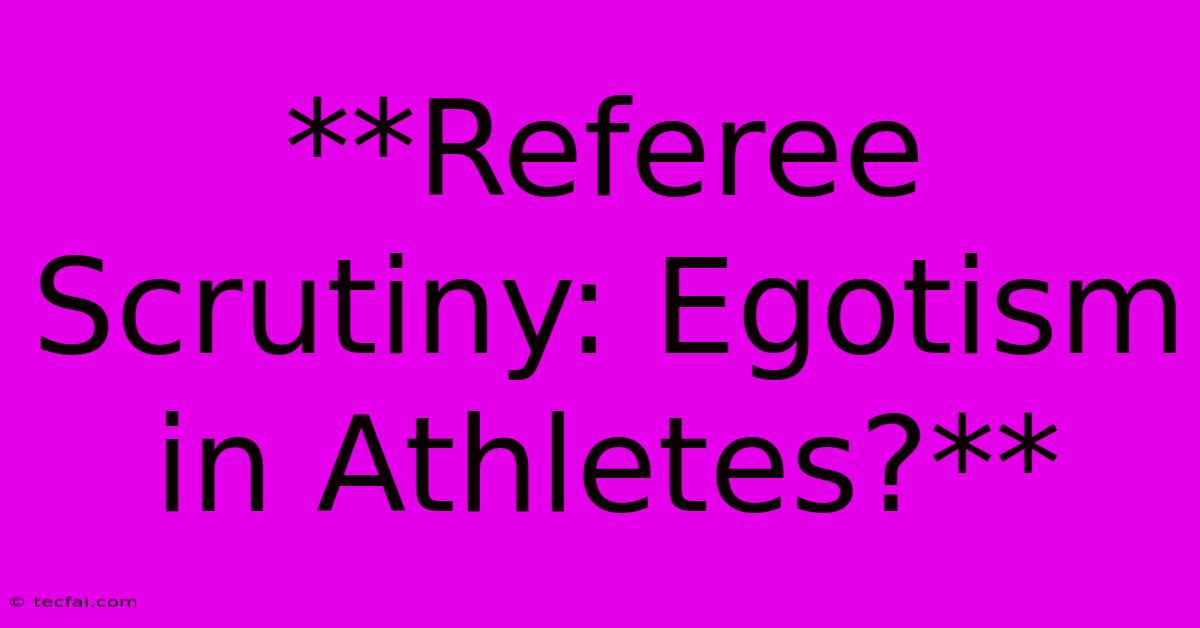**Referee Scrutiny: Egotism In Athletes?**

Discover more detailed and exciting information on our website. Click the link below to start your adventure: Visit Best Website tecfai.com. Don't miss out!
Table of Contents
Referee Scrutiny: Egotism in Athletes?
The relationship between athletes and referees is a complex dance of respect, frustration, and sometimes, outright animosity. While athletes strive for victory, referees are tasked with upholding the rules and ensuring fair play. This dynamic can lead to heightened tensions, particularly when athletes feel that referee decisions are unfair or biased. It begs the question: does the perceived unfairness stem from a genuine sense of injustice, or is egotism at play?
The Athlete's Perspective: A Battle for Fairness
Athletes pour their hearts and souls into their craft, pushing their limits and making sacrifices to excel. When their efforts are seemingly undermined by a referee's call, it's natural to feel a surge of frustration. From their perspective, a missed call can feel like a denial of their hard work, a blow to their confidence, and a potential roadblock to success. This feeling is amplified in high-stakes scenarios, where every decision carries immense weight.
It's important to recognize that not every athlete who questions a referee's decision is fueled by egotism. Sometimes, there is genuine justification for their complaints. Referees are human, and they make mistakes. A misjudgment, a missed foul, or a misinterpreted rule can genuinely impact the course of a game. Furthermore, athletes often have a unique perspective on the action unfolding before them, giving them a potentially clearer understanding of what transpired.
The Ego Factor: A Double-Edged Sword
However, the line between legitimate grievances and ego-driven outbursts can blur. Egotism, the inflated sense of self-importance and the need for validation, can distort an athlete's perception of events. When faced with a call that doesn't go their way, some athletes may resort to blaming the referee, believing they are being targeted or unfairly penalized. This behavior, often characterized by excessive arguing, disrespect, and even physical aggression, can be detrimental to the athlete's image and the integrity of the sport.
It's important to acknowledge that a healthy dose of confidence and determination is essential for athletic success. However, egotism can be a dangerous trap, blinding athletes to their own shortcomings and hindering their growth. Instead of focusing on external factors, athletes should strive to learn from their mistakes, improve their game, and accept the decisions of referees with grace.
Finding the Balance: Respect and Responsibility
The ideal scenario involves a harmonious relationship between athletes and referees, built on mutual respect and professionalism. Referees must remain objective, impartial, and consistent in their rulings, minimizing the potential for perceived bias. Athletes, in turn, must learn to accept unfavorable calls with composure, understanding that mistakes can happen and that the referee's role is to ensure fairness for all players.
When athletes can channel their competitive spirit into positive action, focusing on their own performance and improvement, they can truly unlock their potential. By striving for a greater understanding of the referee's role and fostering a culture of respect, athletes can rise above egotism and contribute to a more positive and productive sporting environment.
Ultimately, the journey to sporting greatness is a collective effort, one that requires cooperation and understanding from all involved. By recognizing the fine line between healthy ambition and egotism, athletes can leverage their competitive spirit to achieve greatness, while simultaneously upholding the integrity and spirit of the game.

Thank you for visiting our website wich cover about **Referee Scrutiny: Egotism In Athletes?**. We hope the information provided has been useful to you. Feel free to contact us if you have any questions or need further assistance. See you next time and dont miss to bookmark.
Featured Posts
-
Usa Vs Jamaica Predicted Starting Xis
Nov 15, 2024
-
Three Lions Triumph Greece Vs England Live
Nov 15, 2024
-
The Waterboys Headline Irish Music Lineup
Nov 15, 2024
-
King Charles Marks Birthday At Coronation Site
Nov 15, 2024
-
The Onion Buys Alex Jones Media Company
Nov 15, 2024
